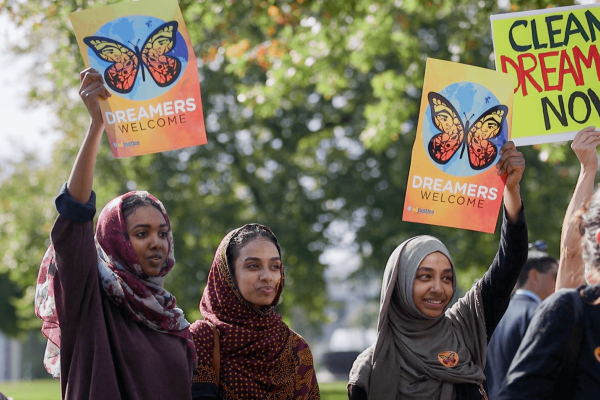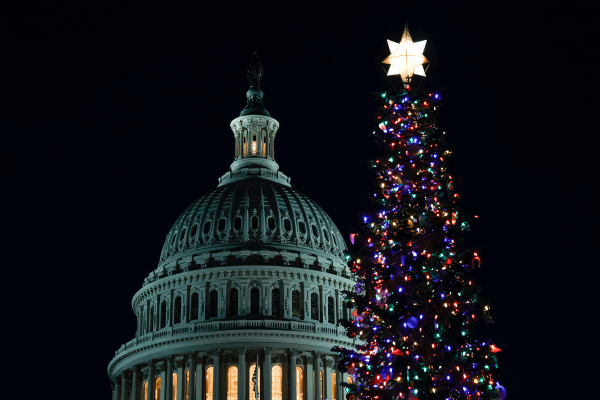There is a national campaign going on — to protect the DREAMers.
Deferred Action for Childhood Arrivals — a 2-year renewable program that defers the deportation of undocumented immigrants who came to America when they were children and makes them eligible to work — now protects the lives of 800,000 young people in America. They go to school, have jobs, have started businesses, have served in the military, and, for most of them, America is the only country they have ever known. In September, President Donald Trump rescinded DACA, giving it an end date of March 2018. So now it is up to Congress to do something.
Since it’s “Faith Week” for the DREAMer protection campaign, let’s read the Bible.
In the Old Testament, the Lord commands: “When a foreigner resides among you in your land, do not mistreat them. The foreigner residing among you must be treated as your native-born. Love them as yourself” (Lev. 19:33–34 NIV). The stranger is not “native-born,” but from another place or country and might often be from another racial or ethnic group. God also tells us, “You shall not oppress a stranger, for you know the heart of a stranger, because you were strangers in the land of Egypt” (Exod. 23:9 NKJV). The reference here is, of course, to when the Jews were themselves outsiders from a different race in a foreign land.
The biblical word ger for “strangers” or “foreigners” in our midst occurs nearly 100 times in the Hebrew Scriptures, with the consistent instruction to protect them. We are commanded to love God, our neighbor, and the stranger. Jesus said to love your neighbors, which of course his listeners took to mean those around them — and those like them. But then Jesus extended the meaning of neighbors to include even the Samaritans. The outsider, usually from a different ethnicity or race, is specifically lifted up to be loved. A very strong point is being made here. While it is assumed that we will love ourselves and our own families, we are commanded to love our neighbors as ourselves, and we are specifically told that the stranger is our neighbor. This is clearly a commandment to include people from other racial communities into our own.
Then there is the Gospel of Matthew, chapter 25, a text that has risen up from the streets in the movement to protect undocumented immigrants around the country. “Matthew 25” has become a pledge, and a grassroots organizing project by that name in places around the country.
Matthew 25 teaches us that how we welcome the stranger into our midst is literally how we treat Christ himself. In the New Testament, the stranger and all who are vulnerable are at the very heart of the gospel. In the Gospel of Matthew, Jesus offers a vision in which caring for them is the defining mark of God’s kingdom: “For I was hungry and you gave me something to eat, I was thirsty and you gave me something to drink, I was a stranger and you invited me in, I needed clothes and you clothed me, I was sick and you looked after me, I was in prison and you came to visit me” (Matthew 25:35-36).
Many of us became deeply involved in the struggle for immigration reform because we strongly believe that fixing our broken immigration system is much more than a political issue or a legal question; it is a moral imperative, and it’s long overdue. The Bible does not lead us to a particular bill or piece of legislation. But our faith as Christians compels us to struggle for a more humane, more compassionate, and more sensible immigration system. Indeed, the Scriptures could not be clearer.
The campaign for comprehensive immigration reform in the United States has drawn many Christians and other people of faith. The presence and influence of people of faith in that struggle has altered the political landscape of the issue, but it has also taught many Christians more about the central role of “the stranger” in biblical history. What has been most eye-opening for many of us in the Hebrew Scriptures is God calling the children of Israel to love three things: first, love the Lord your God; second, love your neighbor; and third, love the stranger (Lev. 19:18, 34; Deut. 6:5; 10:12, 19). This biblical command to love the stranger comes before even the love of our own families and children. That is the clear instruction. It comes after loving our God and loving our neighbor, and singles out the neighbor who is “a stranger,” an outsider—a person who is seen as a different kind of human being than those already in our in-groups. This is an unmistakable command to welcome the stranger and invite the outsider into the community, and, as such, it is an absolute repudiation of racism — and of the racial bigotry that has been central to the Trump campaign and Trump presidency. Throughout the Old and the New Testaments, caring for the outsiders, the sojourners, is central to the call of the people of God.
The Bible commands us and Jesus calls us to welcome the stranger in our midst. It’s not ‘optional’ or ‘suggested’ or ‘hoped for.’ It is our duty as Christians and other people of faith. This is much more than a political debate; it is deeply biblical and theological.
This campaign has called for a clean DREAM Act before the end of this year, one that doesn’t come weighed down with an unnecessary and symbolic border wall or increased funding for ICE raids that rip families apart. These young people and their families deserve clarity, not confusion. We want a path to citizenship for DREAMers and other immigrants because part of the strategy of this administration and their allies is to make sure to never enfranchise immigrants, as their votes would help shape a new America. That is unacceptable. The DREAMers have already lived as citizens and deserve full participation in the American system.
Let’s remember that these anti-immigrant policies are part of a larger resurgence of America’s original sin of racism. We should be crystal clear about that.
While today we fight for a clean DREAM Act this year, we must not lose sight of the need for comprehensive immigration reform. These DREAMers don’t want their parents or their classmates or their co-workers deported, either. That must be our long-term goal. But in the meantime, we ask Congress to pass a clean DREAM act and, if necessary, to override a presidential veto.
The time for action is now — faithful action to welcome the stranger, protect the vulnerable, and build a bridge to a new America.
Got something to say about what you're reading? We value your feedback!






